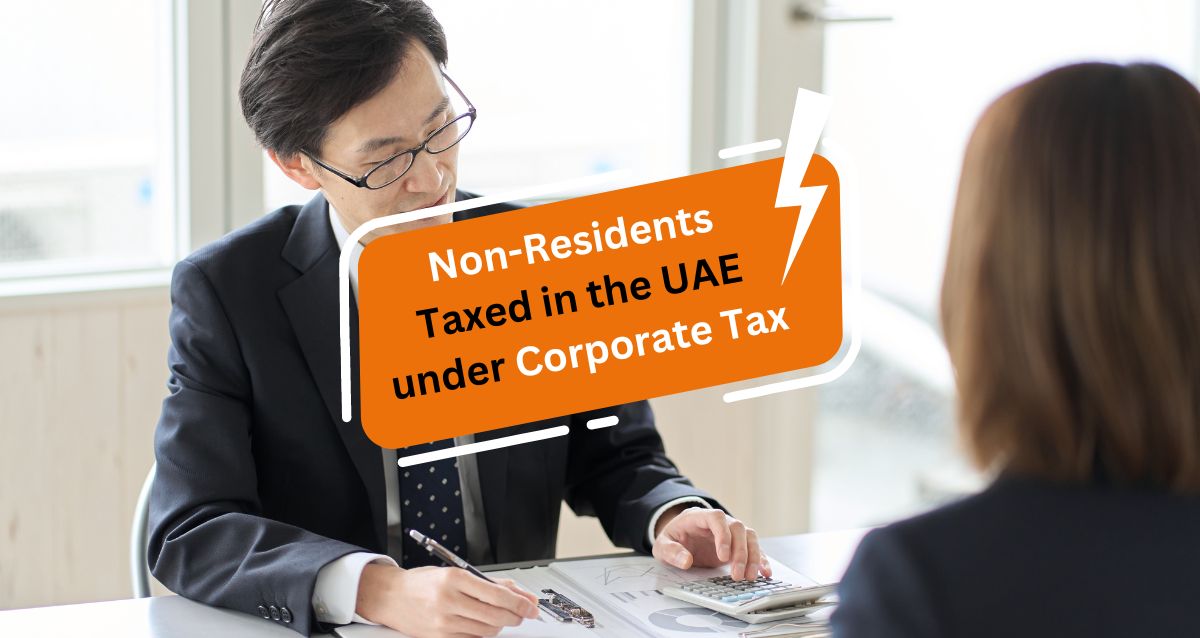Non-Residents Taxed in the UAE under Corporate Tax
The Corporate Tax introduction in the United Arab Emirates (UAE) has raised some confusion for non-residents performing their businesses in this country. We are sure that most of you might still be confused about the Corporate taxation for non-residents in the UAE.
Are you a non-resident looking for a guide to clarify all your confusion about corporate tax in the UAE? If yes, you should invest a few minutes of your precious time with us. Today, we will discuss the Corporate Tax rules for non-residents in UAE. Plus, we will highlight every essential aspect of corporate tax for non-residents in this country.

Who is a non-resident subject to the corporate tax in the UAE?
Indeed, Corporate Tax in the UAE has been applied to non-residents. However, this tax is not applied to all non-residents conducting their businesses in this country. You as a non-resident in this country only will be subject to the Corporate taxation for non-residents in UAE under the following scenarios:
- Permanent Establishment: If you have a fixed place or location in the UAE for your business, you will become a Permanent Resident in this country. In this case, you will be subject to the UAE corporate tax.
- State-sourced income: Suppose you are not a Permanent Establishment. In that case, you will still be liable for the corporate tax if you derive income from within the UAE. These incomes involve profit from selling products or services within the country, rental income from your property in the country, and other income sources that you acquire within the borders of the UAE.
- Nexus with the UAE Real Estate: Suppose you earn income from immovable property situated in the United Arab Emirates (UAE), such as land or buildings. In that case, you will also be subjected to corporate tax, regardless of having a Permanent Establishment or other income sources in the country. The nexus is applicable only for foreign juridical person( Foreign companies), not to natural person.
Exemption For Real Estate Investment Income
As discussed in the previous section, there are three scenarios in which you will be subject to the Corporate Tax in the UAE as a non-resident person. Indeed, nexus with the real estate in this country is one of the scenarios for non-residents like you that makes you liable for the Corporate taxation for non-residents in UAE. However, there are a few cases where you can be exempted from the corporate tax in this country.
While non-resident juridical persons are subject to the Corporate Tax in the UAE, some exemptions are available in this country for certain types of investors from the corporate tax.
Whether directly or through entities like foundations, trusts, or other fiscally transparent vehicles, your real estate investment income as a UAE resident or foreigner might be exempted from the corporate tax in this country if you do not involve a permitted business activity.
Are you wondering about more exemptions? So, keep reading. Real Estate Investment Trusts (REITS) as well as other qualifying investment funds can also qualify for the exemption from the corporate tax in the UAE on income derived from investment in the immovable property in this country.
You should meet the certain requirements outlined by the authorities to avail these exemptions from the corporate tax in the UAE. The Cabinet Decision has brought about enormous changes in the taxation of income derived from your immovable property.
The United Arab Emirates (UAE) focuses on promoting a transparent and fair business environment by aligning with international best practices while ensuring consistency in the treatment of such income.

Register and Tax Return Filing
By reading the previous two sections, you might be clear about whether you are subject to Corporate Tax in the UAE. if you are subjected to the corporate tax in the UAE, you must immediately register your business and file a tax return. Let us look at the steps you need to follow for the registration of corporate tax and filing tax return:
- Initially, you should obtain the Tax Registration Number (TRN) from the Federal Tax Authority (FTA) by registering your business for the corporate tax in order to comply with the tax filing obligation in the UAE.
- After obtaining the TRN for your venture, you should submit an annual tax return mentioning your taxable income and paying the applicable corporate tax.
How do you calculate your taxable income for corporate tax in the UAE?
Before paying Corporate Tax in the UAE, you should calculate your taxable income. Remember, there are two types of income that you should consider while calculating your taxable income. The following is the list of two forms of income that assist you in determining your taxable income:
- Gross income: All income earned under the scope of your permanent establishment or from state-sourced activities, like income from your immovable property.
- Deductible expenses: Expenses incurred in developing your taxable income, including employees' salaries, business expenses, and more.
Key Takeaways from the FTA guidelines for the UAE non-resident Corporate Tax
The UAE's Federal Tax Authority (FTA) has released guidelines to clarify the requirements for non-resident individuals and companies conducting business in the country, in line with the implementation of the national corporate tax regime on June 1st, 2023. Let us take a look at the key takeaways of these guidelines:
- Non-residents are liable for corporate tax if they have a permanent establishment generating more than AED 1 million or “state-source” income from activities.
- Juridical Persons formed outside the UAE are also subject to corporate tax if they have derived revenue from immovable property assets, permanent establishment, and earn state-source income.
- Registration with the FTA and getting the TRN is mandatory for non-residents meeting the criteria to avoid penalties for non-compliance.
- Non-resident Jurisdiction Persons deriving only state-sourced income without permanent establishment or property holding are exempt from tax registration.
- Non-resident taxpayers must comply with ongoing duties, like cases involving the permanent establishment and taxable income calculation.
- Failing to comply with the registration and compliance process might result in administrative penalties.
How can Flyingcolour Tax Consultants help you?
Some non-residents in the UAE are subject to corporate taxes. We are sure that a few of you might still be confused about UAE non-resident corporate tax. Flyingcolour Tax Consultant can help you clear your doubts about corporate tax for non-residents. Our experts can also assist you in registering and filing tax returns for the corporate tax in this country. We can also help you determine the taxable income for your business.
To learn more about How are Non-Residents Taxed in the UAE under Corporate Tax?, book a free consultation with one of the Flyingcolour team advisors.
Disclaimer: The information provided in this blog is based on our understanding of current tax laws and regulations. It is intended for general informational purposes only and does not constitute professional tax advice, consultation, or representation. The author and publisher are not responsible for any errors or omissions, or for any actions taken based on the information contained in this blog.
